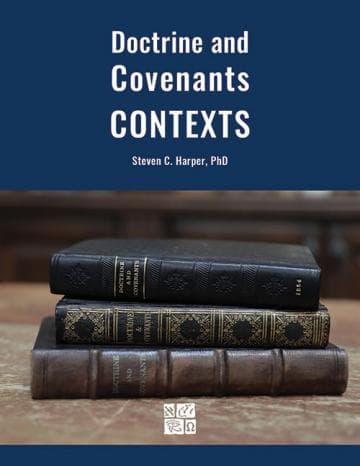Book
136 Chapters

When Joseph Smith left the grove after seeing the Father and the Son, he was not a prophet. He had no calling—and had no idea that he ever would. That calling would come three and a half years later. Joseph’s journal tells the story:
When I was about 17 years, I had another vision of angels; in the night season, after I had retired to bed; I had not been asleep, but was meditating on my past life and experience. I was well aware I had not kept the commandments, and I repented heartily for all my sins and transgressions, and humbled myself before him, whose eye surveys all things at a glance. All at once the room was illuminated above the brightness of the sun; An angel appeared before me.
“I am a messenger sent from God,” he told Joseph, introducing himself as Moroni. He said that God had a vital work for Joseph to do. There was a sacred book written on golden plates, buried in a nearby hillside. “He explained many of the prophecies to me,” Joseph said, including the fourth chapter of Malachi.[1]
Moroni appeared three times that night and again the next day, emphasizing and expounding the same prophecy. Clearly, there was something vital in Moroni’s paraphrase of Malachi, something central to Joseph’s calling.[2] In his manuscript history, Joseph remembered that Moroni’s version of Malachi’s prophecy varied from the King James Version text. Speaking on behalf of the God of Israel, Moroni explicitly mentioned priesthood: “Behold I will reveal unto you the Priesthood by the hand of Elijah the prophet before the coming of the great and dreadful day of the Lord.” Joseph said Moroni quoted the next verse differently too: “And he [Elijah] shall plant in the hearts of the children the promises made to the fathers, and the hearts of the children shall turn to their fathers. If it were not so the whole earth would be utterly wasted at his coming.”[3]
In the Doctrine and Covenants, angels are sent to solve problems that Joseph doesn’t know exist. In section 2, Joseph knew he needed forgiveness, but he didn’t know that the earth was on track to be utterly wasted unless Elijah came soon and things took a dramatic turn. President Russell M. Nelson taught that “eternal life, made possible by the atonement, is the supreme purpose of Creation. To phrase that statement in its negative form, if families were not sealed in holy temples, the whole earth would be utterly wasted.”[4] Section 2 is the Lord’s announcement to Joseph that Elijah will endow him with priesthood powerful enough to seal families forever, reverse the trend toward death and the disintegration of families it causes, and thus fulfill the purpose for which the planet was created (see section 110).
Joseph just prayed for forgiveness. He received it in section 2, along with a calling to save the earth. From the earliest revelation in it, the Doctrine and Covenants points us to the temple, the Savior’s priesthood, and the ultimate purpose of sealing families.
[1] “History, 1838–1856, volume A-1 [23 December 1805–30 August 1834],” p. 5, The Joseph Smith Papers, accessed July 21, 2020.
[2] “Journal, 1835–1836,” p. 24, The Joseph Smith Papers, accessed July 21, 2020.
[3] Dean C. Jessee, editor, The Papers of Joseph Smith (Salt Lake City: Deseret, 1989), 1:278.
[4] Elder Russell M. Nelson, Conference Report (October 1996), 97.
Book
136 Chapters
Items in the BMC Archive are made publicly available for non-commercial, private use. Inclusion within the BMC Archive does not imply endorsement. Items do not represent the official views of The Church of Jesus Christ of Latter-day Saints or of Book of Mormon Central.